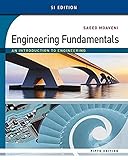Engineering fundamentals, SI : an introduction to engineering / Saeed Moaveni, Minnesota State University, Mankato ; SI edition prepared by Keith Mclver.
Material type: TextPublisher: Australia : Cengage Learning, [2016]Edition: Fifth editionDescription: xxiii, 807 pages : color illustrations ; 26 cmContent type: text Media type: unmediated Carrier type: volumeISBN: 9781305105720; 1305105729Uniform titles: Engineering fundamentals Subject(s): Engineering | EngineeringDDC classification: 620 LOC classification: TA147 | .M63 2016
TextPublisher: Australia : Cengage Learning, [2016]Edition: Fifth editionDescription: xxiii, 807 pages : color illustrations ; 26 cmContent type: text Media type: unmediated Carrier type: volumeISBN: 9781305105720; 1305105729Uniform titles: Engineering fundamentals Subject(s): Engineering | EngineeringDDC classification: 620 LOC classification: TA147 | .M63 2016| Item type | Current library | Call number | Copy number | Status | Notes | Date due | Barcode |
|---|---|---|---|---|---|---|---|
 Books
Books
|
Main Library | TA147 .M63 2016 (Browse shelf (Opens below)) | 1 | Available | STACKS | 51952000232872 |
Browsing Main Library shelves Close shelf browser

|

|

|

|

|

|

|
||
| TA147 .C44 2004 Principles of applied civil engineering design / | TA147 .E97 2010 Exploring engineering : an introduction to engineering and design / | TA147 .E97 2016 Exploring engineering : an introduction to engineering and design / | TA147 .M63 2016 Engineering fundamentals, SI : an introduction to engineering / | TA147 .R357 2016 A course in electrical engineering materials / | TA147 .S255 2010 Elements Of Civil Engineering by Bhargab Mohan Das Mimi Das Saikia and Madan Mohan Das | TA147 .T45 2015 Thinking like an engineer : an active learning approach / |
Rev. ed. of: Engineering fundamentals / Saeed Moaveni.
Includes index.
Part 1: Engineering -- 1. Introduction to the engineering profession -- 2. Preparing for an engineering career -- 3. Introduction to engineering design -- 4. Engineering communication -- 5. Engineering ethics -- Part 2: Engineering Fundamentals -- 6. Fundamental dimensions and units -- 7. Length and length-related variables in engineering -- 8. Time and time-related variables in engineering -- 9. Mass and mass-related variables in engineering -- 10. Force and force-related variables in engineering -- 11. Temperature and temperature-related variables in engineering -- 12. Electric current and related variables in engineering -- 13. Energy and power -- Part 3: Computational Engineering Tools -- 14. Computational engineering tools electronic spreadsheets -- 15. Computational engineering tools MATLAB -- Part 4: Engineering Graphical Communication -- 16. Engineering drawings and symbols -- Part 5: Engineering Material Selection -- 17. Engineering materials -- Part 6: Mathematics, Statistics, and Engineering Economics -- 18. Mathematics in engineering -- 19. Probability and statistics in engineering -- 20. Engineering economics -- Appendix.
This text helps readers develop the strong problem-solving skills and solid foundation in fundamental principles they will need to become analytical, detail-oriented, and creative engineers. The book opens with an overview of what engineers do, an inside glimpse of the various areas of specialization, and a straightforward look at what it takes to succeed. The book then covers the basic physical concepts and laws that you'll encounter on the job. Professional Profiles throughout the text highlight the work of practicing engineers from around the globe, tying in the fundamental principles and applying them to professional engineering. Using a flexible modular format, the book demonstrates how engineers apply physical and chemical laws and principles, as well as mathematics, to design, test, and supervise the production of millions of parts, products, and services that people use every day.
1

There are no comments on this title.